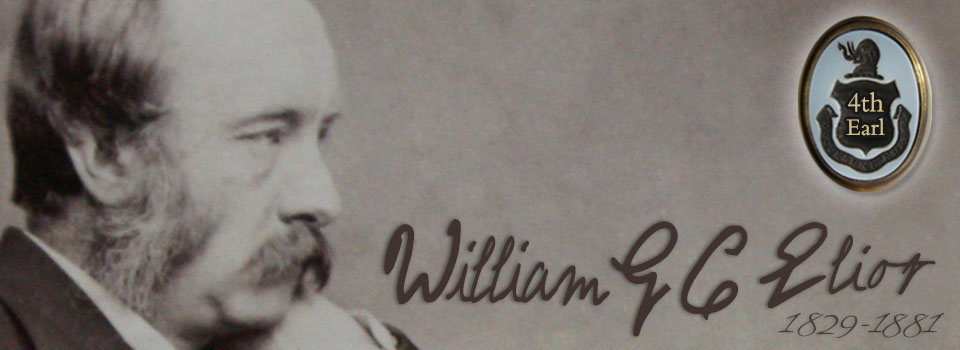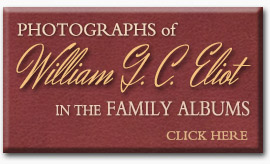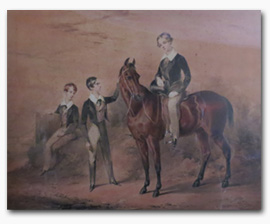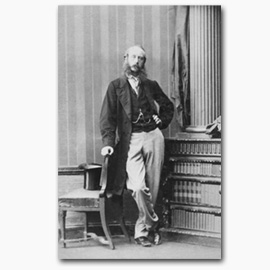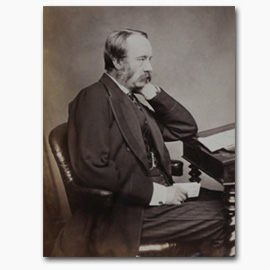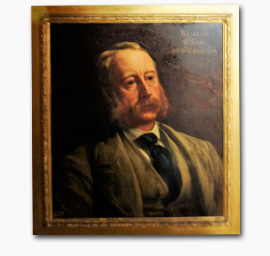William Gordon Cornwallis Eliot, 4th Earl of St. Germans (1829 - 1881)
William was the fourth child and third son of Edward Granville Eliot and Jemima Cornwallis.
I have not finished writing the full biography for William Eliot, so the text below includes some newspaper transcriptions and quotes that offer basic information and insight into his character. An in-depth biography will be added in the future, along with transcriptions of many of his boyhood letters.

("Illustrated London News" 24 Sep 1870, page 4)
The Gazette contains the official notification that the Queen has ordered a writ to be issued, summoning Lord Eliot to the House of Peers by the title of Baron Eliot, of St. Germans, int he county of Cornwall. The new peer is the eldest son of the Earl of St. Germans, by the third daughter of the second Marquis of Cornwallis. He was born at Port Eliot, Cornwall, in 1829, and was educated at Eton. In 1853 he was appointed second paid Attache to the Embassy at Berlin, having previously served the Foreign Office at Madrid and at Lisbon. Subsequently his Lordship was Attache at St. Petersburg. He has also been Secretary of Legation at Rio Janeiro and at Athens. In May, 1866, in conjunction with Mr. Montagu Chambers, he was returned for Devonport as a Liberal, the present Lord Colchester and Mr. H.C. Raikes, M.P., for Chester, having been the unsuccessful Conservative candidates. He is a prominent member of the High Church party.

("St. Edward's School Chroncle" April 1873, page 16)
MISCELLANEOUS.
The following gentlemen have kindly consented to act as patrons to the School:--- The Very Rev. the Dean of Manchester, Rev. Canon Liddon, D.D., Rev. Canon Bright, D.D., Rev. Canon King, M.A., Lord Eliot, Hon. Gerald Ponsonby, Right Hon. Sir William Heathcote, Hon. C.L. Wood.
. . . Lord Eliot rose and said how pleased he was to be present on such an occasion, he did not know why the Head Master had selected him to distribute the prizes, unless it was that he himself had never in all his life won a prize, (laughter) he did not want to detain us long, for he was sure we wanted to be out in the sunshine (laughter). One thing he should like to say, he heard the spelling in some of the papers was rather erratic, and he therefore cordially recommended those who neglected to take care of their Ps. and Qs., to go in for Spelling Bs. next term. He was glad to see so much interest taken in the music, with great pleasure he had listened that morning to the service in Chapel, and it now fell to his lot to award the Choir Prize. In his day at Eton, if any one dared to interfere with the musical part of the service which Her Majesty's Gentlemen of the Chapel Royal appropriated to themselves, he was speedily suppressed. Wishing us all happy holidays, his Lordship sat down amid a storm of cheering, he then distributed the prizes to the following recipients . . .

("Illustrated London News" 10 Oct 1874, page 7)
Lord Eliot, the eldest son of the Earl of St. Germans, spoke at a church missionary meeting held last week in the Cornish town from which his father derives his title. Lord Eliot declared that it was never more urgently the duty of the Church of England to be hearty in the propagation of the Gospel than at the present time. No man could fail to see that there was at least a possibility, if not a probability, before long of the termination of the union between Church and State.

("The Story of My Life" Vol. 3 by Augustus John Cuthbert Hare, 1901, page 203)
Lord Eliot was also here. I found great grace in his sight, and was most pressingly invited to Port Eliot. I went on Saturday. He met me at the station, and I was almost walked off my feet for four hours, being shown every picture in the house, every plant in the garden, and every walk in the woods. There is a limit in what ought to be shown, and Lord Eliot has never found it out.
Still Port Eliot is a beautiful place. The house and the grand old church of St. Germans' Priory — chiefly Norman — stand close together, on shaven green lawns, radiant with masses of flowers and backed by luxuriant woods, amid which walks open here and there upon glimpses of rock and terraces near one of the salt fiords which are so common in this country.

("Cornishman" 24 March 1881, page 4)
DEATH OF THE EARL OF ST. GERMANS.
The illness of Lord St. Germans --- commencing with an attack of bronchitis, followed by a rapid accession of weakness, general congestion of the internal organs, and weak action of the heart --- terminated fatally on Saturday. His Lordship was only 51 years of age, having been born in December, 1829. He was educated at Eton, was a Deputy Lieutenant for Cornwall, and at one time represented Devonport in the Liberal interest. He was summoned to the House of Lords in 1878. Lord St. Germans, as the Hon. Mr. Eliot, was 1st paid attache at St. Petersburg, and 2nd paid attache at Berlin, was Secretary of Legation at Rio Janeiro and at Athens, and also action Secretary of Legation at Washington. He was exceedingly popular in the neighbourhood of Port Eliot, St. Germans, and was always ready to assist any good work, his park being always at the disposal of temperance bodies, &c., for their fetes.
A muffled peal was rung in St. German's Church on Sunday, and a touching allusion to his lordship's memory was made at the morning service. The Earl was never married, and is succeeded in the title and estates by his brother, (also unmarried) the Hon. Henry Cornwallis Eliot. The deceased will probably by buried at Kensal Green, where his mother lies.

"Morning Post" 25 March 1881)
The Late Earl of St. Germans
The funeral of the late Earl of St. Germans took place yesterday. The funeral cortege, which consisted of a hearse and four and three mourning coaches, started from the late peer's residence in Grosvenor-gardens for Kensal-green Cemetery shortly after eleven o'clock. The mourning carriages were occupied by the Hon. Henry C. Eliot (now Earl of St. Germans), Hon. and Rev. Walter and Lady Louisa Ponsonby, Mr. C. Ponsonby, Mr. Walter Ponsonby, and Miss Ponsonby. On reaching the cemetery chapel, about a quarter past twelve, the mourners were met by a number of personal friends of the deceased, those attending including Earl Beauchamp, the Earl of Onslow, Lord Braybrooke, Colonel Hon. Charles E. Edgecumbe, Sir Massey Lopes, Sir Charles Graves-Sawle, Sir John St. Aubyn, M.P., Mr. Alexander Ross, Mrs. and Miss Ross, Mr. and Mrs. Whatman, Colonel de Morel, Mr. E. Martin, Mr. Pendarvis, Mr. Burton, the Rev. A., Furneaux, Mr. Tucker, and Mr. Pocille. The funeral service was read by the Rev. Frederick J. Ponsonby, M.A. Before the mourners left the chapel the hymn "Weary of Earth" was sung by a surpliced choir. The corpse was then borne to the grave, where the Service for the Burial of the Dead was concluded by the choir singing "Jesus Lives! no longer now," &c. The remains of the late earl are deposited in a brick grave at the extreme north-west end of the cemetery, just behind the chapel, wherein are placed at rest the remains of his mother, the late Countess, who was buried there in July, 1856, and of her infant child, interred in March, 1835. The outer coffin, of polished oak, had on the lid a silver plate bearing the following inscription: — "William Gordon Cornwallis Eliot, fourth Earl of St. Germans. Born December 14, 1829; died March 19, 1881." The funeral arrangements were carried out by Messrs. Johnstone and Jeanes, of New Bond-street.

("Illustrated London News" 16 Jul 1881, page 21)
WILLS AND BEQUESTS.
The will (dated Oct. 27, 1870) of the Right Hon. William Gordon Cornwallis, Earl of St. Germans, late of Port Eliot, Cornwall, and of No. 13, Grosvenor-gardens, who died on March 19 last, was proved on the 30th ult. by Henry Cornwallis, Earl of St. Germans, the brother and sole executor, the gross value of the personal estate amounting to 47,500 pounds. The testator bequeaths 4,000 pounds each to his sister, Lady Louisa Susan Cornwallis Ponsonby, and his brother, the Hon. Charles George Cornwallis Eliot, and he wishes them both to choose, as a memento of him, some article he has personally used. The residue of his estate he gives to his brother, the present peer.


William G. C. Eliot enjoyed posing for photographs, so there are quite a lot of them surviving in the Port Eliot albums – as well as others always turning up in collections of family friends.
Three identified portraits of William survive in the Port Eliot collection. The earliest is an 1843 watercolour of the three elder sons of Edward, 3rd Earl St. Germans. This was painted by Edward Hayes, an Irish painter of some renown, and shows the three boys in Eton school uniform. The other portraits at Port Eliot are by G. W. Baldry (no date) and D. White (no date).
